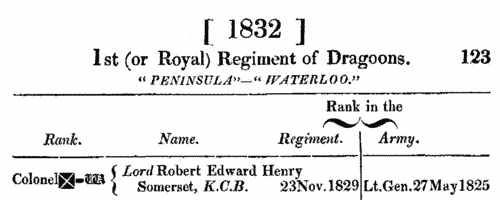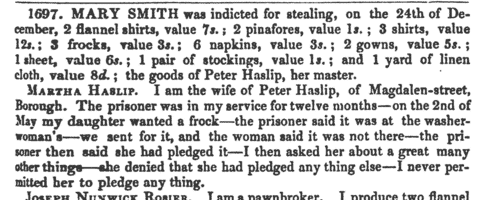Donoghue Surname Ancestry ResultsOur indexes 1000-1999 include entries for the spelling 'donoghue'. In the period you have requested, we have the following 135 records (displaying 1 to 10): Single Surname Subscription | | | Buying all 135 results of this search individually would cost £778.00. But you can have free access to all 135 records for a year, to view, to save and print, for £100. Save £678.00. More... |
These sample scans are from the original record. You will get scans of the full pages or articles where the surname you searched for has been found. Your web browser may prevent the sample windows from opening; in this case please change your browser settings to allow pop-up windows from this site.  Apprentices
(1775) Apprentices
(1775)
Apprenticeship indentures and clerks' articles were subject to a 6d or 12d per pound stamp duty: the registers of the payments usually give the master's trade, address, and occupation, and the apprentice's name, as well as details of the date and length of the apprenticeship. 1 January to 31 December 1775.DONOGHUE. Cost: £8.00.  | Sample scan, click to enlarge

| Irish Insolvents
(1829)
Insolvency notices for Ireland: insolvency often caused people to restart their lives elsewhere, so these are an important source for lost links, especially for emigrantsDONOGHUE. Cost: £6.00.  | Sample scan, click to enlarge

| Officers of the British Army
(1832)
The annual Army List, published By Authority, first lists officers of the rank of major and above, by rank, and with dates of appointment to each successive higher rank; holders of crosses, crosses with clasps (with number of clasps indicated), medals, medals with clasps (with number of clasps indicated) are marked as such; and an ornate W indicates those officers actually present in any of the actions of 16, 17 or 18 June 1815 and therefore awarded the Waterloo Medal. For each officer in this section, the final column notes his then present or immediately former regiment and/or office, if any. Next, all the officers of the army are listed, down to the rank of ensign, by regiment or corps, giving rank, name, date of rank in the regiment, and date of rank in the army, with occasional further notes. Again, holders of medals are duly noted, as in the first list. For each regiment the paymaster, adjutant, quartermaster, surgeon and assistant surgeons are named, as well as the civilian agent; and the regimental motto, battle honours, and colours of the facings and lace of the dress uniform are stated. After the British regiments of the line, the officers of the West India infantry, the Ceylon rifles, the Royal African Colonial Corps, the Cape Mounted Riflemen, the Royal Newfoundland Veterans, and the Royal Malta Fencibles are given; then the officers of the garrisons and other military establishments in Great Britain, Ireland, North America and Gibraltar (with Malta); the Royal Artillery; Commissariat Department; Medical Department; Chaplains' Department; officers retained on full pay; officers on British half pay; and officers on Foreign half pay (including the German Legion, the Brunswick Cavalry, the Brunswick Infantry, Chasseurs Brittaniques, Corsican Rangers, Dillon's Regiment, the Greek Light Infantry, Malta Regiment, Meuron's Regiment, Roll's Regiment, Sicilian Regiment, Watteville's Regiment, and the York Light Infantry Volunteers).DONOGHUE. Cost: £4.00.  | Sample scan, click to enlarge

| Insolvents
(1839)
Insolvency notices for England and Wales: insolvency often caused people to restart their lives elsewhere, so these are an important source for lost linksDONOGHUE. Cost: £6.00.  | Sample scan, click to enlarge

| Insolvents
(1839)
Insolvency notices for England and Wales: insolvency often caused people to restart their lives elsewhere, so these are an important source for lost linksDONOGHUE. Cost: £6.00.  | Sample scan, click to enlarge

| London criminals and witnesses
(1839)
Minutes of the evidence presented at the Central Criminal Court were recorded in shorthand by Henry Buckler. This volume covers the whole proceedings of the Queen's Commission of the Peace, Oyer and Terminer, and Gaol Delivery, for the City of London, and Gaol Delivery for the county of Middlesex and those parts of the counties of Essex, Kent and Surrey lying within the jurisdiction of the Central Criminal Court, for the 7th to 12th sessions, from May to October 1839. The index covers both the accused and the witnesses (including police constables &c.) summoned to give evidence. The accused's name is given an asterisk if previously in custody; and a dagger if a 'known associate of bad characters'. Each entry usually concludes with the age of the accused, the verdict, and, where guilty, the sentence.DONOGHUE. Cost: £6.00.  | Sample scan, click to enlarge

| County Cork Freeholders: Booth No 1
(1841)
The poll books of voters in the parliamentary election for county Cork 13 to 15 July 1841 delivered in to the select committee that subsequently looked into the propriety of the proceedings, and then annotated with observations as to those votes to which objection had been raised. There are separate books for seven booths, with the electors' names in order of voting: giving each freeholder's full name, place of abode, situation of the freehold, value, number and date in the alphabetical registry book, and for which candidates they voted (Daniel O'Connell, Edmund Burke Roche, Nicholas Philpot Leader, and Robert Longfield). The seven booths are for these areas: 1. Duhallow barony; 2. Hall County Side, East East Carbery, West East Carbery and East West Carbery; 3. Barrymore and West West Carbery; 4. Condons and Fermoy; 5. Imokelly and West Muskerry.DONOGHUE. Cost: £6.00.  | Sample scan, click to enlarge

| County Cork Freeholders: Booth No 2
(1841)
The poll books of voters in the parliamentary election for county Cork 13 to 15 July 1841 delivered in to the select committee that subsequently looked into the propriety of the proceedings, and then annotated with observations as to those votes to which objection had been raised. There are separate books for seven booths, with the electors' names in order of voting: giving each freeholder's full name, place of abode, situation of the freehold, value, number and date in the alphabetical registry book, and for which candidates they voted (Daniel O'Connell, Edmund Burke Roche, Nicholas Philpot Leader, and Robert Longfield). The seven booths are for these areas: 1. Duhallow barony; 2. Hall County Side, East East Carbery, West East Carbery and East West Carbery; 3. Barrymore and West West Carbery; 4. Condons and Fermoy; 5. Imokelly and West Muskerry.DONOGHUE. Cost: £6.00.  | Sample scan, click to enlarge

| County Cork Freeholders: Booth No 6
(1841)
The poll books of voters in the parliamentary election for county Cork 13 to 15 July 1841 delivered in to the select committee that subsequently looked into the propriety of the proceedings, and then annotated with observations as to those votes to which objection had been raised. There are separate books for seven booths, with the electors' names in order of voting: giving each freeholder's full name, place of abode, situation of the freehold, value, number and date in the alphabetical registry book, and for which candidates they voted (Daniel O'Connell, Edmund Burke Roche, Nicholas Philpot Leader, and Robert Longfield). The seven booths are for these areas: 1. Duhallow barony; 2. Hall County Side, East East Carbery, West East Carbery and East West Carbery; 3. Barrymore and West West Carbery; 4. Condons and Fermoy; 5. Imokelly and West Muskerry.DONOGHUE. Cost: £6.00.  | Sample scan, click to enlarge

|  London Policemen
(1830-1842) London Policemen
(1830-1842)
The Metropolitan Police Register of Joiners (MEPO 333/4) lists policemen joining the force through to 31 December 1842 (to warrant number 19892). The register is alphabetical, in so far as the recruits are listed chronologically grouped under first letter of surname. It is evidently a continuation of a similar earlier register, not closed until its alphabetical sections were filled: consequently, there are no entries in this register for the initial letters N, O, Q, U, V, X, Y or Z; and the sections of this register start at different dates - A 18 April 1840 (warrant number 16894); B 11 December 1830 (5570); C 7 September 1830 (4988); D 27 May 1833 (8445); E 15 December 1838 (14476); F 30 March 1832 (7372); G 1 December 1835 (11,184); H 25 April 1832 (7457); I and J 13 February 1837 (12449); K 2 January 1838 (13457); L 3 October 1834 (9905); M 15 November 1832 (7999); P 4 October 1831 (6869); R 4 September 1837 (13021); S 30 March 1835 (10366); T 6 April 1840 (16829); W 30 December 1833 (9096). The register gives Date of Appointment, Name, Number of Warrant, Cause of Removal from Force (resigned, dismissed, promoted or died), and Date of Removal. Although the register was closed for new entrants at the end of 1842, the details of removals were always recorded, some being twenty or more years later. Those recruits not formerly in the police, the army, or some government department, were required to provide (normally) at least two letters of recommendation from persons of standing, and details of these are entered on the facing pages: the names in these are indexed separately - this index refers only to the police constables. Where a recruit was only recently arrived in the metropolis, the names and addresses of the recommenders can be invaluable for tracing where he came from.DONOGHUE. Cost: £8.00.  | Sample scan, click to enlarge

|
Research your ancestry, family history, genealogy and one-name study by direct access to original records and archives indexed by surname.
|













